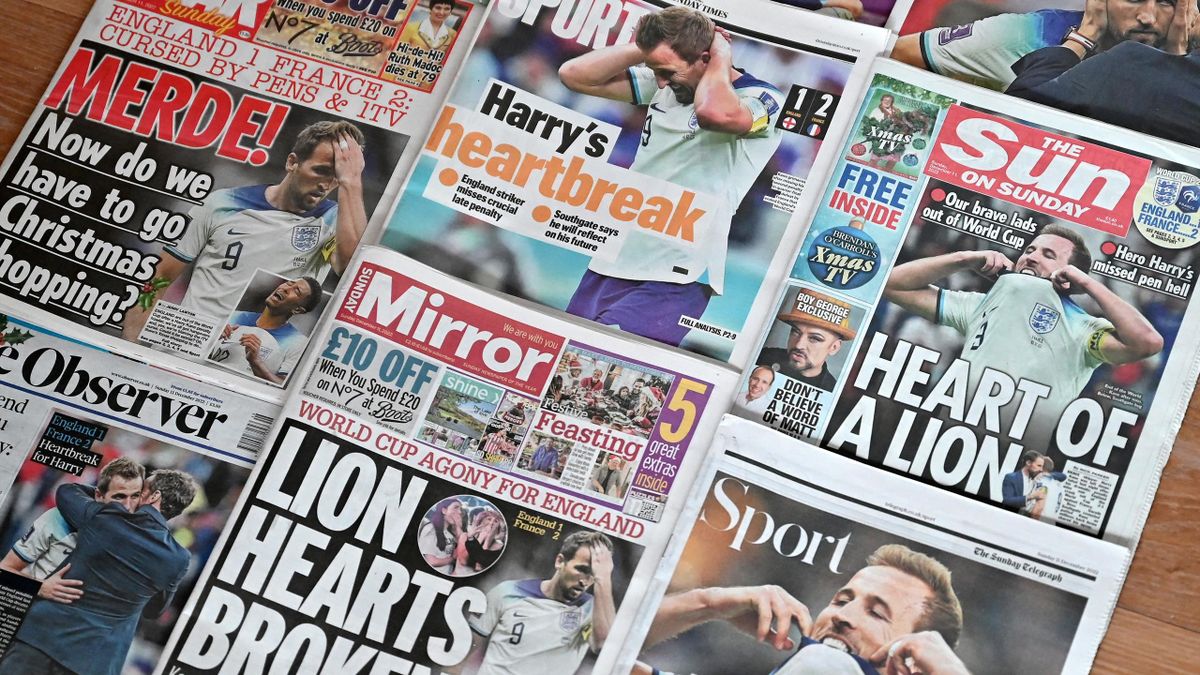MONDAY’S BIG STORIES
ENGLAND’S WAITING
Whatever you might have to say about the actual football, England are pretty good at going out of tournaments. Sometimes it happens via a penalty shoot-out, and sometimes after being outclassed by one of the nations with a few more stars above their badge. It’s as much a ritual as the throwing of the pints.
Well, not this time. Yes, they lost to France, and in normal time too. But for once, this was a result that could have gone either way, and England weren’t so much outclassed as outmomented. Which isn’t a word. And that’s how unusual this is: we’re having to invent words for it. A bit more luck here, a bit more kicking-the-penalty-at-the-goal there; for all the talk about France and the inevitability of champions, they got away with plenty of unchampionlike faffing around. That’s probably not a word either. We’re off the dictionary.
As such, there is a gnawing empty space at the heart of the discourse. Traditionally, this space in the footballing calendar is reserved for fulminating against the inadequacies of the England set-up, be that the manager, the training base, the feckless players; or perhaps some great conniving other that has stolen the flowers from Our Brave Boys. But none of those really apply here.
Even the chirp about the referee rather founders on the fact that England got two penalties out of him and his VARs. You could call him inconsistent, and maybe even pompous; you could call the rain wet and the wind cold. Hard to argue it was the officials that came between England and victory.
Ultimately, England had a plan to beat the world champions, and it more or less worked. England went into the tournament with a lot of very good players, and they all played pretty well. The only reason they didn’t win is the fact that they lost. Sounds stupid when you write it down, but hopefully you take the point.
And so instead of the sickness that comes with a defeat on penalties, or the rancour that comes with getting outpassed by another one of those tiny midfielders that England just cannot produce, there now comes a moment of waiting. Of tapping toes and checking watches; of trying to generate intense feeling around such marginal concerns as “Maybe Rashford could have had a few more minutes here and there,” or “What’s the point of taking James Maddison if you’re not going to play James Maddison.” Not bad questions. Not quite “We need to rip it up and start again.”
At some point over the next week or so, Gareth Southgate will decide if he wants two more years of all this, and his bosses at the FA will decide if he deserves them. You can put together a relatively sane case for any outcome, though we’re guessing that the decent showing here coupled with the lack of an obvious alternative should at least protect him from the sack. Until then, though, it’s not quite clear what this defeat means. The ending has passed; we’re still waiting for the sense of it.
KIND OF BLUES
Of course, the other thing about England is the discourse – even when it’s inchoate and unformed – does rather expand to fill available space. So let’s think about France for a moment. Describing them as the world champions – like we did up there – is of course correct. So is calling them favourites.
But this is a weird team. The game’s crucial moment came, after all, when Theo Hernandez ploughed straight through the back of Mason Mount. A penalty, eventually, and he was only saved from a red by the fact that the ball was sailing harmlessly past. Which in turn only accentuates how daft a thing it was for him to do. Champions know how to win close games, of course they do. Champions also get away with it.
Of course, if Didier Deschamps had his way, then it wouldn’t have been Hernández charging across. He’d have been watching from the bench. At a rough guess, we reckon at least half of the outfielders that started for France on Saturday night wouldn’t be in Deschamps preferred starting eleven, if it weren’t for injuries. (The same figure for England is… two?) The defence in particular is a rejigged, improvised thing, with only Raphaël Varane in his own right place.
This isn’t intended as a dig at England. But it is making France’s progress through this tournament significantly more intriguing. They kept four clean sheets on their way to victory in Russia; they managed a single one this time around. By rights there should be a gathering inevitability to their progress, as the other big teams stumble, trip and collapse around them. But this is undercut by the fact that they are, to a a really quite considerable extent, making it up as they go along. Kylian Mbappé up one end, a giant ball of gaffer tape at the other.
OTHER ENDINGS
It’s a dangerous time to be an ageing great. Cristiano Ronaldo was out of the Portugal first team before he left the tournament in tears. Lionel Messi is walking through the tournament, looking every inch a man in the middle of One Last Job. And Neymar, having hinted at international retirement before the tournament, notably failed to rule it out afterwards.
“Honestly, I do not know. I think talking now is bad because of the heat of the moment. Maybe I’m not thinking straight. To say that this is the end would be rushing myself, but I don’t guarantee anything either. Let’s see what happens going forward.”
Ronaldo has insisted that he won’t be retiring, and perhaps he’ll be indulged for another four years. And it’s easy enough to imagine Neymar deciding that a last World Cup adventure in North America might be a good time – he’ll still only be 34. But on the face of it, international football is standing on the precipice of a significant vibe shift.
It’s only a little bit of an exaggeration to say that both Argentina and Brazil – that is to say, two of this planet’s greatest footballing nations; two perennial World Cup contenders – have spent the last decade or so building around the freakishly brilliant superstar in their midst. Only reasonable: if you have a Messi, you build around your Messi. But in the absence of any obvious heir, the next versions of Brazil and Argentina are going to have be completely retooled into something more collective, more systematised. Portugal are of course already on this path, having seen the good and the bad of the post-Ronaldo future in their last-16 and quarter-final games.
The last few World Cups have been dominated, for good and for ill, by the narrative arcs of the superstars: think of 2014 in particular, as Neymar addressed the nation from his hospital bed and Messi had his heart ripped out in the final. Come 2026, Mbappé may be out there all on his own, a lonely titan surrounded by ordinary goodness and ordinary greatness. It’s going to feel very different. And possibly quite refreshing.
IN OTHER NEWS
The best goal of yesterday was scored by Kirsty Hanson for Aston Villa, a precise line from boot to net that just happens to dip when it reaches the goalkeeper.
RETRO CORNER
Go looking for previous meetings between Morocco and France, and the pickings are slim but strange: a tour through some of football’s more obscure international competitions. The teams have played two friendlies, met twice in the Hassan II Trophy, once in the 1988 Tournoi de France, and twice in the Mediterranean Games. Though for those last two games France sent their amateurs and Morocco their Olympic squad, so you can count those as you like.
Here’s the most recent of their meetings, from 2007, a 2-2 draw played out in what sounds like a pretty tasty atmosphere at Stade de France. A young Karim Benzema earned his seventh cap, but otherwise both sides have entirely reinvented themselves. We’ll take another four-goal thriller, please and thank you.
HAT TIP
It’s Kylian Mbappé’s tournament and Kylian Mbappé’s world, but the game against England was broken open by one of his supporting cast, the endlessly delightful Antoine Griezmann. Who has been everywhere this tournament, combining playmaking duties with a surprising amount of scrapping around in defensive midfield.
Here’s Eric Devin and Adam White, over at the Guardian, dealing out the praise to “a player whose role for France has been ever-changing.”
“With Blaise Matuidi, Paul Pogba and N’Golo Kanté all out of the picture for this tournament, Deschamps was forced to rebuild his midfield almost on the fly. [It] was no small shock when he announced pre-tournament that rather than continue with the same 3-4-1-2 that France had played at the European Championship last summer, with Griezmann in a free role behind Mbappé and Karim Benzema, he would play with four at the back.”
Tchouaméni in to hold, Rabiot in to shuttle, and… Griezmann as a kind of makeshift Pogba? Well, why the hell not. “Despite frequently being the most advanced of the midfield trio, he plays a more complete role, not only supporting the front three going forward but also adding attacking impetus on the right side of the pitch … Of course, Griezmann’s creativity is undimmed […] but he has also taken on a more defensive role when France are not in possession, averaging as many tackles as Tchouaméni.”
COMING UP
West Brom are off to Sunderland, to play in temperatures of -3 celsius, with the roads frozen and the trains on strike, and you know what? Somebody is still going to give out about the players wearing gloves.














